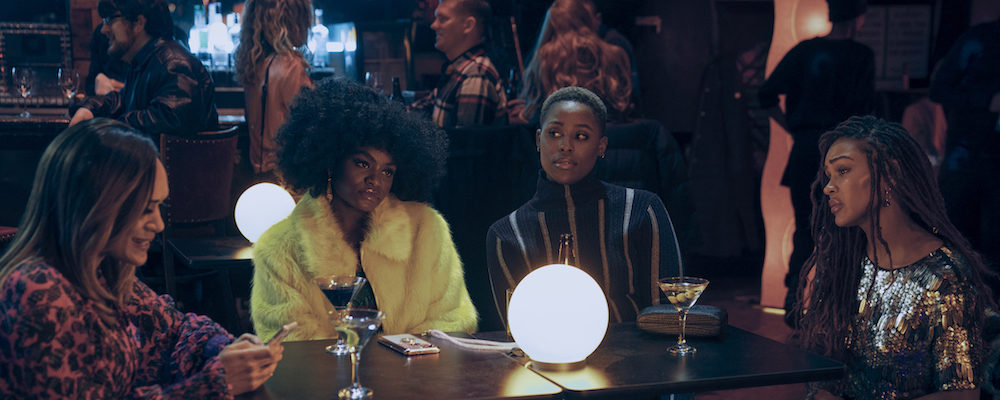‘Harlem’: Sex, Love and Single in the City
Sandra Miska
In Amazon comedy series “Harlem,” “Girls Trip” writer Tracy Oliver takes a familiar formula and makes it her own. Like “Sex and the City,” and more recently, “Run the World,” the show centers around four thirtysomething women navigating romance, careers and life in New York City. Like “Run the World,” the four central characters are all Black women. And while Oliver also takes some cues from “Sex and the City,” “Harlem” stands apart by digging in deeper into social issues, such as gentrification, interracial dating, and racial bias in medicine.
Just like Sarah Jessica Parker’s Carrie Bradshaw, Camille (Meagan Good) provides insightful voiceover, but while Carrie was a journalist writing about sex and relationships, Camille is a professor of anthropology at Columbia, so she sees the world through that lens, which is more intellectual. Her Mr. Big is Ian (Tyler Lepley), an ex she broke up with five years prior to the start of the series after his chef training took him to Paris. Old feelings resurface as soon as she sees him again in episode one, but their reunion is marred by his new love, glamorous Brit Mira (Rana Roy).
While Camille’s romantic plot is predictable –– one can see the twists and turns coming a mile away –– Good is given a meatier storyline when it comes to Camille’s career. In the first few episodes, she is on track to getting tenure and has the full support of her boss and mentor, Robin (Andrea Martin). After Robin’s fired over statements she made at a femnist rally that are perceived as transphobic, she is replaced by Dr. Pruitt (a no-nonsense Whoopi Goldberg). While Camille is excited to work with another Black woman, Dr. Pruitt isn’t impressed with her resume and activism, which includes protesting a gentrifying restaurant that it turns out –– surprise, surprise! –– Ian is the head chef for. This impasse in her career leads to a crisis of identity for Camille that is relatable to all those Millennials and others who spent years in school and making a responsible career plan only to have the rug pulled out from under them.
Quinn (Grace Byers), meanwhile, has taken risks in her career, leaving her lucrative job in finance to start her own sustainable fashion boutique, but has had little payoff. She’s stuck asking for money from her wealthy parents, much to the annoyance of her disapproving immigrant mother (Jasmine Guy, best known as the rich girl on “A Different World,” making an interesting accent choice here). Like a lot of single women in their thirties, she’s had a string of disappointing romantic entanglements. Her first love interest in season one is an exotice dancer, Shawn (Robert Ri’chard), who has more going on for him than just his hot bod. He’s also a single dad with a heart of gold. This relationship is rooted in fantasy, as only in a female-centric series of film does a gal go to strip show and pick up Mr. Perfect. Her late-season attraction to a bright female politician, Isabela (Juani Feliz), and the confusion this causes her is a subplot slightly more tethered to reality.
Shoniqua Shandai provides much of the comic relief as Angie, a struggling singer. “Harlem” differs from “Sex and the City” and “Run the World” by including a character who is truly financially unstable. Her present struggle seems very relatable and realistic, especially when one considers that there are so many musicians and actors trying to “make it” in NYC,”although her backstory about once having been a singer on the rise seems like fantasy. After months of sleeping on Quinn’s couch, she reluctantly accepts a small role in “Get Out: The Musical,” which turns out to be just as ridiculous as it sounds. But Angie isn’t always the butt of the joke, as she’s often the most vocal when it comes to calling out microaggressions and other foolishness.
Finally, there’s Tye (Jerrie Johnson), the most successful woman in the group career-wise (she’s the creator of the first dating app for queer POC), but also the one who gets dealt the worst hand overall. Growing up gay in Georgia, she fled to NYU where she met the other three women. After a series of flings, she seems to hit it off with a freelance writer, Anna (Kate Rockwell), only to pull the plug because she’s uncomfortable with being in an interracial relationship. It doesn’t gel with her brand, but it goes deeper than that. Oliver really piles on her towards the end of the season after what starts off as a painful menstrual cycle puts her in the hospital. There, she is subjected to racist and sexist treatment that is all too common in the real world. Just when things couldn’t get worse, someone from her past resurfaces and causes her stress that leads to self-reflection.
The freshman season of “Harlem” culminates in a cliffhanger, and all four ladies’ fates are up in the air for various reasons. Camille’s ending in particular has a very old-school, only-in-New York romantic feel. It’s a reminder that the city is a fifth character here, full of hope, second chances, and regrets.
“Harlem” begins streaming Dec. 3 on Amazon Prime Video.

